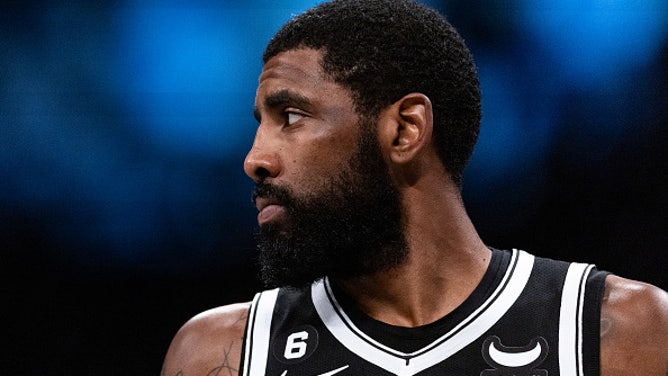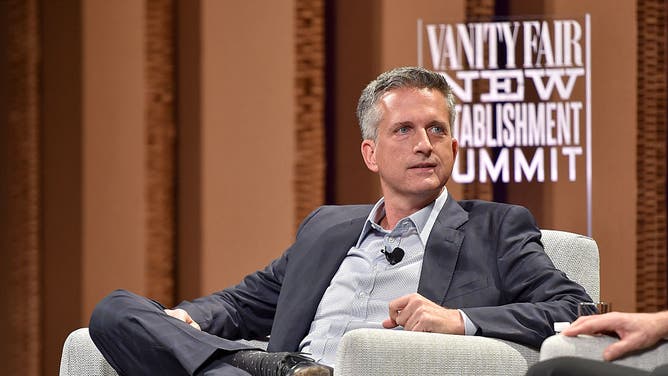Bill Simmons Questions COVID Mandates, Boosters: 'I Don't Know If I Would Do It The Next Time'
During a recent podcast discussion with The Atlantic's Derek Thompson, Bill Simmons acknowledged that COVID policies and mandates had extremely negative consequences.
The Ringer founder and CEO also acknowledged that the conversation on COVID vaccines has dramatically shifted in the past 12-18 months.
Specifically, Simmons referenced the discussion on Kyrie Irving, who famously refused to get vaccinated while playing for the Brooklyn Nets.
Due to New York City's ridiculous COVID policies, Irving was prevented from playing in home games due to his vaccination status.
READ: KYRIE IRVING ON FORCED VACCINES: ‘BIGGEST VIOLATIONS OF HUMAN RIGHTS IN HISTORY’
While many sportswriters lambasted Irving for his stance, Simmons acknowledged that further research has at least partially vindicated him and others who chose not to get vaccinated or boosted.
"Some of the research has come out, there's been some side effects and things like that. It just feels like there's more dialogue about it now, versus where we were a year ago with Kyrie," he said during his podcast.
He continued, "Anecdotally, a lot of people are like, would you get the vaccine the next time, would you get the booster? Eh, I don't know, I don't know if I would do it the next time, it just feels like the virus keeps changing, there's these new forms, what's the point of getting a booster, versus 18 months ago, just blindly 'Bill, oh I gotta get it, they're telling me to get it.' Now it feels like there's a little more resistance to that."

NEW YORK, NEW YORK - NOVEMBER 01: Kyrie Irving #11 of the Brooklyn Nets looks on during a break in the action during the first quarter of the game of the Chicago Bulls at Barclays Center on November 01, 2022 in New York City. (Photo by Dustin Satloff/Getty Images)
Simmons on Boosters
Simmons also explained that shifting attitudes may be due to how many Americans got the booster shots just before the Omicron variant emerged, only to almost immediately get COVID anyway.
"Especially if you just got the booster right before the Omicron virus kicked in, and people who just got the booster got COVID anyway, and I think that was, that was a little bit of a tipping point moment, I know it was for me."
That's when Derek Thompson responded with a few blatant inaccuracies.
While admitting that the vaccines did not live up to expectations with regards to transmission, he said that CDC data shows a massive gap in the mortality rates of vaccinated to unvaccinated people from COVID. He then claims that the CDC data is the "best we have."
Except, of course, the CDC data is not the best data we have.
The CDC aggregates state reports of data by vaccination status. Except that many states lump in those with an "unknown" vaccination status into the "unvaccinated" category. That helps contribute to a dramatic disparity in results compared to data from other countries.
Additionally, those who are partially vaccinated can be lumped into the "unvaccinated" category.
It's a near certainty that the CDC realizes this misattribution can lead to wildly inaccurate claims of real world efficacy that do not align with countries with better data tracking.
It's not too surprising that Thompson makes this mistake however, as he's blocked many users (this writer included) who tried to put out obvious flaws in his reasoning throughout the pandemic.
COVID Lockdowns Damaged Children
Finally, Simmons and Thompson discuss the staggering decline in mental health among teenage girls. Thompson treats the horrifying trend as a mystery, but Simmons acknowledges that pandemic restrictions were almost certainly a substantial contributor.
"This is not a situation where you can easily point to some material condition in the US, and say well, of course, teen anxiety is spiking." It's an "unbelievably fascinating mystery," Thompson said.
That's when Simmons described how pandemic policies affected younger people as well as elderly people who were isolated from support networks.

SAN FRANCISCO, CA - OCTOBER 07: HBO's Bill Simmons speaks onstage during "Ahead of the Curve - The Future of Sports Journalism" at the Vanity Fair New Establishment Summit at Yerba Buena Center for the Arts on October 7, 2015 in San Francisco, California. (Photo by Mike Windle/Getty Images for Vanity Fair)
"We're not 100% of the pandemic, but we're mostly out of the pandemic, but we have some distance from it finally. And I think we're going to really start to put the pandemic in a big picture perspective with how it affected certain demographics of people," Simmons explained. "And I think it's teenagers, I think it's people who were out of college who were about to have their 20's and they just got robbed for two, three years, and then I think it's older people who were by themselves."
He continued, "Some stuff's going to come out about just how damaging and scary that was for those people, and how stressful that was, and that they're not out of it yet. Even though we're kind of out of it, they're not, they've been changed. It had a profound effect on multiple demos that we're still kind of, unpacking."
Simmons also brought up how his daughter wasn't able to return to normal, mask-free schooling for several years. Now she's going to college without having had a typical end of high school experience.
Thompson, whose media outlet was one of the foremost voices in favor of strict pandemic lockdowns and repeatedly spread misinformation about the efficacy of COVID policies, acknowledged that Simmons was correct.
Yet he bemoans the fact that COVID discussions have been separated into ideological debates. Thompson also says he wants to have a thorough examination to see what the right policies were, by comparing other countries and how their approaches differed.
Except we've already conducted that experiment. States like Florida and countries like Sweden were supposed to be COVID disaster areas. Yet by following science and not succumbing to unnecessary panic, they achieved similar results to other areas with strict mandates, while prioritizing continued functions of normal society.
When people like Bill Simmons acknowledge the harms of pandemic policies, it signals a dramatic shift in the public discussion.
For multiple years, prominent media figures were essentially not allowed to question the necessity of endless boosters, or admit that pandemic policies were not necessarily justified.
But this change in mentality signifies that the conversation has finally changed.
As Simmons' explanation shows, it's important to acknowledge the harms of these policies to ensure they never happen again.